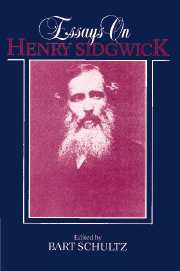Book contents
- Frontmatter
- Contents
- Foreword
- Acknowledgments
- List of contributors
- List of abbreviations
- Introduction: Henry Sidgwick today
- PART I Common-sense morality, deontology, utilitarianism
- PART II Egoism, dualism, identity
- 5 Sidgwick's pessimism
- 6 Sidgwick and the history of ethical dualism
- 7 Sidgwick and the rationale for rational egoism
- 8 Sidgwick on ethical judgment
- PART III Hedonism, good, perfection
- PART IV History, politics, pragmatism
- Index
8 - Sidgwick on ethical judgment
Published online by Cambridge University Press: 05 June 2012
- Frontmatter
- Contents
- Foreword
- Acknowledgments
- List of contributors
- List of abbreviations
- Introduction: Henry Sidgwick today
- PART I Common-sense morality, deontology, utilitarianism
- PART II Egoism, dualism, identity
- 5 Sidgwick's pessimism
- 6 Sidgwick and the history of ethical dualism
- 7 Sidgwick and the rationale for rational egoism
- 8 Sidgwick on ethical judgment
- PART III Hedonism, good, perfection
- PART IV History, politics, pragmatism
- Index
Summary
British moral philosophy has had two great traditions. Its empiricist tradition, which began with Hobbes and resurged with Hume and the classical utilitarians on whom Hume exercised so much influence, takes ethical judgments to be founded on or to originate in desire or feeling. Its intuitionist tradition, which formed in reaction to Hobbes and continued by way of debate with Hume and the classical utilitarians, takes ethical judgments to be deliverances of reason which subserve neither desire nor feeling and in which one recognizes and affirms morality's fundamental precepts. Within the empiricist tradition several works have supreme importance as alternative statements of its philosophy. Within the intuitionist tradition, by contrast, The Methods of Ethics, Sidgwick's masterwork, towers above the others.
The pedigree of Sidgwick's Methods is established early in the work when, in the third chapter of its first book, Sidgwick queried the nature of ethical judgment and gave in response a distinctively intuitionist account. He fashioned this account to settle the dispute between intuitionism and empiricism over the proper conception of ethical judgment, and the argument he advanced for his side appears to leave empiricism without a rejoinder. This argument is the subject of the present study. In the first two sections I shall set it out as I read it and argue for this reading as against an alternative. Then, in the third and last section, I shall critically examine the argument and assess its cogency.
- Type
- Chapter
- Information
- Essays on Henry Sidgwick , pp. 241 - 258Publisher: Cambridge University PressPrint publication year: 1992
- 3
- Cited by



